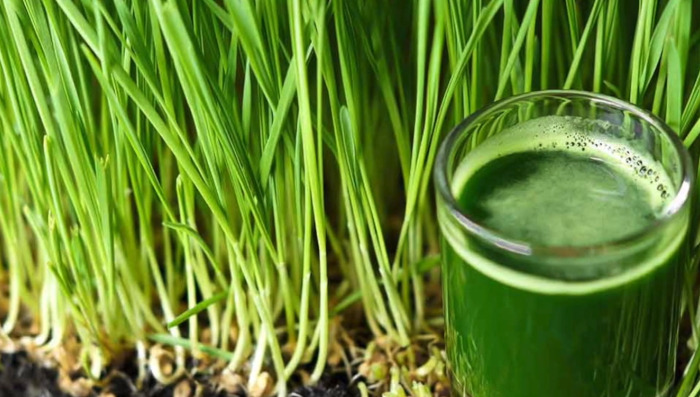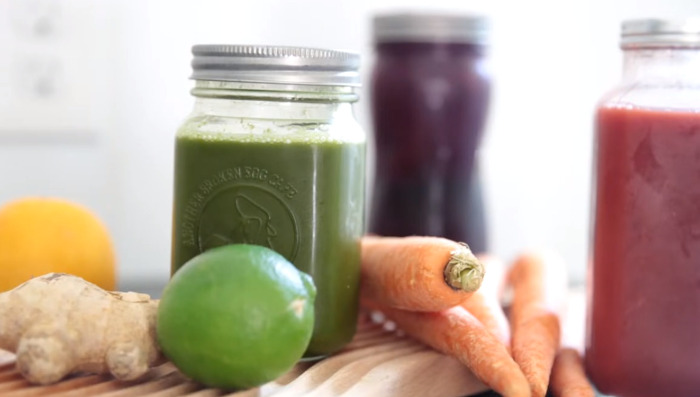What is Constipation?
Constipation is a common digestive issue that many people experience at some point in their lives. It occurs when bowel movements become less frequent and difficult to pass. While occasional constipation is usually not a cause for concern, chronic constipation can lead to discomfort and other health issues.
The primary causes of constipation include a low-fiber diet, insufficient fluid intake, lack of physical activity, and certain medical conditions or medications. When you don’t consume enough fiber, your stool can become hard and dry, making it challenging to pass.
To alleviate constipation, it’s essential to increase your fiber intake, drink plenty of water, and engage in regular physical activity. Additionally, incorporating natural remedies like fruit juices with high fiber content, such as prune juice, can help soften the stool and promote more comfortable bowel movements.
Understanding the causes and remedies for constipation can empower you to take proactive steps towards maintaining healthy digestion and overall well-being.
Equipments for making juice:
Here’s a list of essential equipment you’ll need:
1.Juicer: Invest in a good-quality juicer to extract juice from fruits and vegetables effectively. There are various types, such as centrifugal juicers, masticating juicers, and citrus juicers, so choose one that suits your needs.
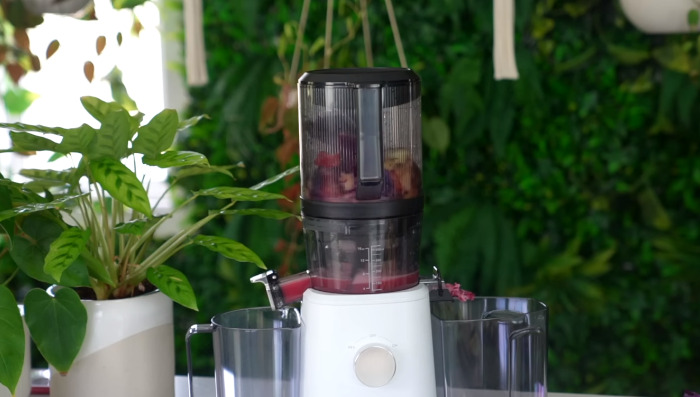
2.Blender or Nutribullet: While a juicer extracts liquid from fruits and vegetables, a blender or Nutribullet is handy for making smoothies and thicker juices. It’s excellent for retaining fiber and nutrients.
3.Glass Containers: Store your freshly squeezed juices in glass containers to maintain their freshness and prevent any plastic-related chemicals from leaching into your drinks.
4.Cutting Board and Knife: You’ll need these to prepare your fruits and vegetables by chopping and slicing them before juicing.
5.Strainer: A fine-mesh strainer can help remove excess pulp or seeds if you prefer a smoother juice.
6.Citrus Reamer: If you’re making citrus juices like lemon or orange juice, a citrus reamer can be useful for extracting the maximum juice from fruits.
7.Measuring Cups: Precise measurements are crucial for recipes, so having a set of measuring cups is handy.
8.Pitcher: Use a pitcher with a lid to mix and store larger quantities of juice.
9.Ice Cubes Trays: If you like your juices chilled, ice cubes trays can come in handy.
10.Cleaning Brushes: Cleaning your juicer or blender thoroughly is essential. Cleaning brushes designed for kitchen appliances can simplify the process.
3 best recipes for juice to combat constipation:
1.Prune Juice:
Here’s a simple prune juice recipe that can provide relief from constipation:
Ingredients:
- 5-6 prunes
- 1/2 teaspoon honey
- 1/2 teaspoon cumin powder
- 1 cup warm water
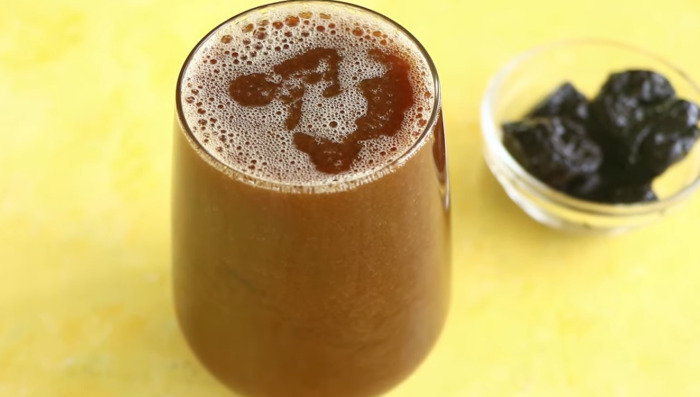
Instructions:
- Begin by soaking 5-6 prunes in a cup of warm water for about 5 minutes. This will help soften them and make them easier to blend.
- As the prunes soak, remove their pits.
- Toss the pitted prunes into a blender.
- Add 1/2 teaspoon of honey for a touch of sweetness.
- Sprinkle in 1/2 teaspoon of cumin powder. Cumin can be beneficial for gut health.
- Pour in the cup of warm water that the prunes were soaked in.
- Blend all the ingredients together until you have a smooth and consistent mixture.
- Pour the freshly prepared prune juice into a glass.
- Enjoy your homemade prune juice for constipation relief!
2.Apple juice:
Here’s a simple apple juice recipe that can help relieve constipation:
Ingredients:
- 2 apples, washed and chopped
- 1/2 lemon, juiced
- A pinch of black salt
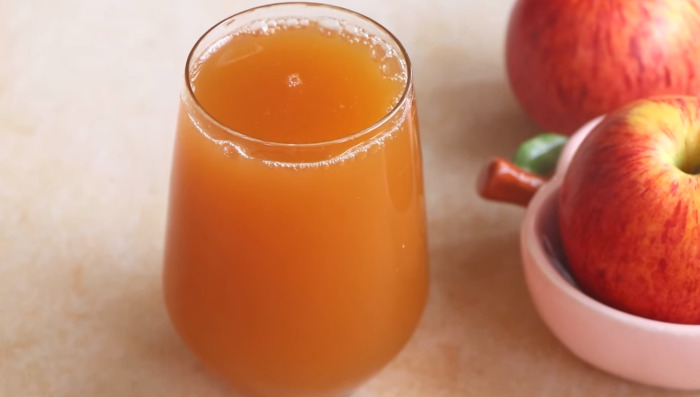
Instructions:
- Start by washing and chopping two apples. It’s not necessary to peel them, as the skin contains valuable fiber.
- Squeeze the juice of half a lemon.
- Place the chopped apples and lemon juice in a blender.
- Add a pinch of black salt for flavor and its potential digestive benefits.
- Blend the mixture until it becomes a smooth juice.
- Pour the freshly prepared apple juice into a glass.
- Stir it well to ensure the black salt is evenly distributed.
- Your constipation-relief apple juice is ready to drink!
3. Orange juice:
Here’s a straightforward orange juice recipe that can help relieve constipation:
Ingredients:
- 2 oranges, peeled and segmented
- 1/2 lemon
- 1/2 teaspoon honey (optional)
- 1/2 teaspoon cumin powder
- 1 cup warm water
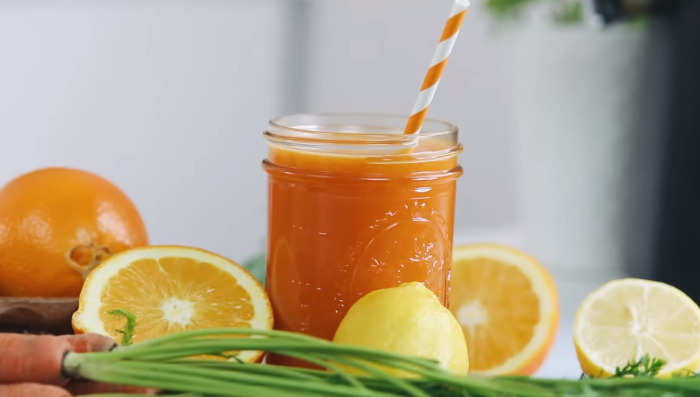
Instructions:
- Begin by peeling and segmenting two oranges. Make sure to remove any seeds if present.
- Squeeze the juice from half a lemon into a cup of warm water.
- Add the orange segments to a blender.
- Pour the lemon-infused warm water into the blender as well.
- Optionally, you can add 1/2 teaspoon of honey for a touch of sweetness, although this is entirely optional.
- Sprinkle in 1/2 teaspoon of cumin powder. Cumin can contribute to maintaining good gut health.
- Blend all the ingredients together until you have a smooth and refreshing orange juice mixture.
- Pour the freshly prepared orange juice into a glass.
- Stir well and relish your homemade orange juice for constipation relief!
Why Drink Juices For Constipation?
here are some compelling reasons why you should consider incorporating fruit juices into your diet to alleviate constipation:
1. Natural Source of Fiber: Fruit juices, such as prune juice and pear juice, are rich in dietary fiber. Fiber adds bulk to your stool, making it easier to pass through your digestive system and preventing constipation.
2. Hydration: Many fruit juices have high water content, which helps keep your body well-hydrated. Proper hydration is essential for maintaining regular bowel movements.

3. Nutrient-Rich: Fruit juices are packed with essential vitamins and minerals, including vitamin C. These nutrients support overall digestive health and can contribute to smoother bowel movements.
4. Gentle Laxative Effect: Some fruits, like prunes and cherries, contain natural compounds like sorbitol that act as gentle laxatives, helping to stimulate bowel movements.
5. Digestive Aid: Ingredients like lemon and cumin in fruit juices can support good gut health and improve digestion, which is crucial for preventing constipation.
6. Convenient and Tasty: Fruit juices offer a convenient and delicious way to combat constipation. They can be easily prepared at home and customized to your taste preferences.
Side effects of juices for constipation?
Certainly, let’s explore the potential side effects of juicing for constipation relief:
1. Overconsumption of Sugar: Fruit juices, especially those from concentrate or store-bought varieties, can contain high amounts of added sugars. Excessive sugar intake may lead to weight gain and increase the risk of diabetes. It’s advisable to use fresh, homemade juices and avoid adding extra sugar.
2. Digestive Upset: Some individuals may experience digestive discomfort, gas, or bloating when consuming certain fruit juices, particularly in large quantities. It’s important to listen to your body and moderate your juice intake accordingly.
3. Weight Gain: While fruit juices are generally considered healthy, they can be calorie-dense. Consuming them in excess without considering overall calorie intake may contribute to weight gain.
4. Dental Health: Fruit juices, especially citrus varieties like orange and lemon juice, are acidic and can potentially harm tooth enamel if consumed frequently. It’s a good practice to rinse your mouth with water after drinking acidic juices.
5. High Fructose Content: Some fruits used in juices, like apples and pears, contain fructose, a natural sugar. In large amounts, fructose can lead to gastrointestinal discomfort, including diarrhea or abdominal pain, in sensitive individuals.
6. Potential Allergies: Individuals with allergies to specific fruits or ingredients in the juices should be cautious and avoid those juices to prevent allergic reactions.
7. Blood Sugar Spikes: For people with diabetes or insulin resistance, consuming large quantities of sugary fruit juices can cause rapid spikes in blood sugar levels. It’s essential to monitor blood sugar levels and consult with a healthcare professional if you have concerns.
8. Lack of Fiber: Juicing extracts the fiber content from fruits, which is essential for healthy digestion. Without fiber, juices may not provide the same digestive benefits as whole fruits.
Wrapping up:
In conclusion, addressing constipation can be effectively supported by incorporating natural fruit juices into your diet. Grape juice, with its hydrating properties, assists in smoother bowel movements. Soluble fibers in various fruit juices aid in promoting regularity. Fennel seeds offer a natural solution by maintaining water in the stool.
Apple juice, rich in dietary fiber, acts as a gentle laxative, while pear juice’s sorbitol content facilitates bowel movement. Prune juice contains both fiber and sorbitol, making it an excellent choice. Cherry juice’s fiber content adds bulk to stool, easing evacuation. Lemon juice, packed with vitamin C and fiber, contributes to both digestion and immunity.
While these juices are beneficial, moderation is key, and it’s essential to consider individual sensitivities and overall dietary habits. To maximize benefits, opt for homemade, preservative-free juices. Maintaining a diet rich in fiber, healthy fats, and proper hydration complements juice consumption for a well-rounded approach to constipation relief.
FAQs:
What foods help immediately with constipation?
Certain foods can provide quick relief from constipation. Prunes, due to their natural laxative effect, are a go-to choice. High-fiber fruits like apples, pears, and kiwis aid in softening stool. Fiber-rich vegetables such as broccoli and spinach are also beneficial. Incorporating whole grains like oats and brown rice into your diet can promote regular bowel movements. Additionally, drinking warm water or herbal teas can stimulate digestion. While these foods can offer immediate relief, it’s essential to maintain a balanced diet rich in fiber, fluids, and healthy fats for long-term digestive health.
What foods make constipation worse?
Constipation can be exacerbated by certain foods. Highly processed items like fast food, chips, and sugary snacks often lack fiber, making it difficult for the digestive system to function efficiently. Red meat and dairy products can also slow down digestion due to their low fiber content. Additionally, excessive caffeine and alcohol consumption may lead to dehydration, further contributing to constipation. It’s essential to limit these foods and prioritize a balanced diet with plenty of fiber-rich fruits, vegetables, whole grains, and water to maintain optimal digestive health and prevent constipation.


